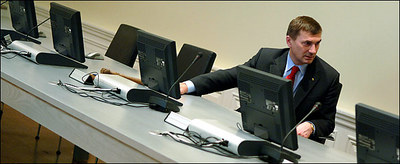
“Prime Minister Andrus Ansip of Estonia in the cabinet room, which is equipped with a computer for each minister.” Source of caption and photo: online version of NYT article quoted and cited below.
(p. A4) TALLINN, Estonia – Estonia, one realizes after a few days in the abiding twilight of a Baltic winter, is not like other European countries.
The first tip-off is the government’s cabinet room, outfitted less like a ceremonial chamber than a control center. Each minister has a flat-screen computer to transmit votes during debates. Then there is Estonia’s idea of an intellectual hero: Steve Forbes, the American publishing scion, two-time candidate for the Republican presidential nomination and tireless evangelist for the flat tax.
Fired with a free-market fervor and hurtling into the high-tech future, Estonia feels more like a Baltic outpost of Silicon Valley than of Europe. Nineteen months after it achieved its cherished goal of joining the European Union, one might even characterize Estonia as the un-Europe.
“I must say Steve Forbes was a genius,” Prime Minister Andrus Ansip declared during an interview in his hilltop office. “I’m sure he still is,” he added hastily.
The subject was the flat tax, which Mr. Forbes never succeeded in selling in the United States. Here in the polar reaches of Europe it is an article of faith. Estonia became the first country to adopt it in 1994, as part of a broader strategy to transform itself from an obscure Soviet republic into a plugged-in member of the global information economy.
By all accounts, the plan is working. Estonia’s economic growth was nearly 11 percent in the last quarter – the second fastest in Europe, after Latvia, and an increase more reminiscent of China or India than Germany or France.
People call this place E-stonia, and the cyber-intoxication is palpable in Tallinn’s cafes and bars, which are universally equipped with wireless connections, and in local success stories like Skype, designed by Estonian developers and now offering free calls over the Internet to millions.
. . .
Germans showed how allergic they were to the idea when Angela Merkel chose a flat tax advocate as her economic adviser. Antipathy toward him was so intense that political analysts say it probably cost Chancellor Merkel’s party a clear majority in the German Parliament.
Yet the concept has caught on in this part of Europe. Latvia, Lithuania and Slovakia all have a flat tax, while the Czech Republic and Slovenia have considered one. Tax policy, not support for the American-led war in Iraq, is the bright line that separates the so-called old Europe from the new.
For the full article, see:
MARK LANDLER. “Letter From Estonia: A Land of Northern Lights, Cybercafes and the Flat Tax.” The New York Times (Weds., December 21, 2005): A4.
(Note: ellipsis added.)

